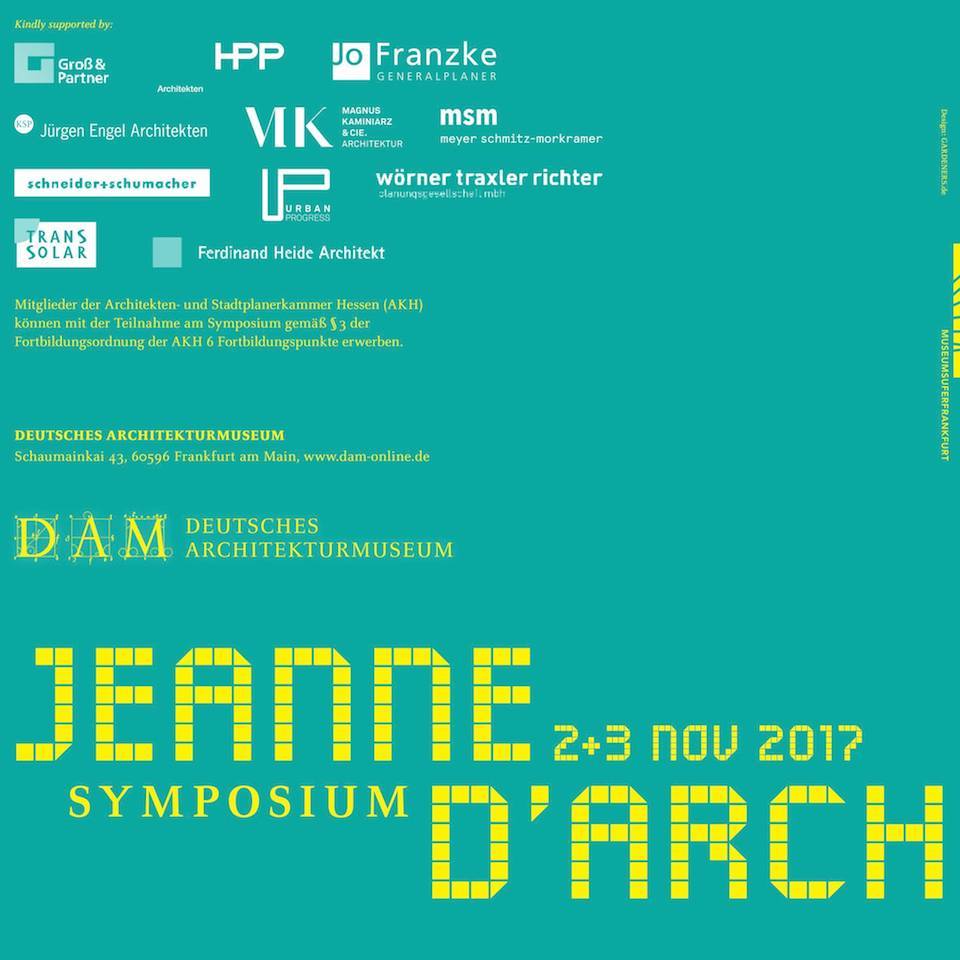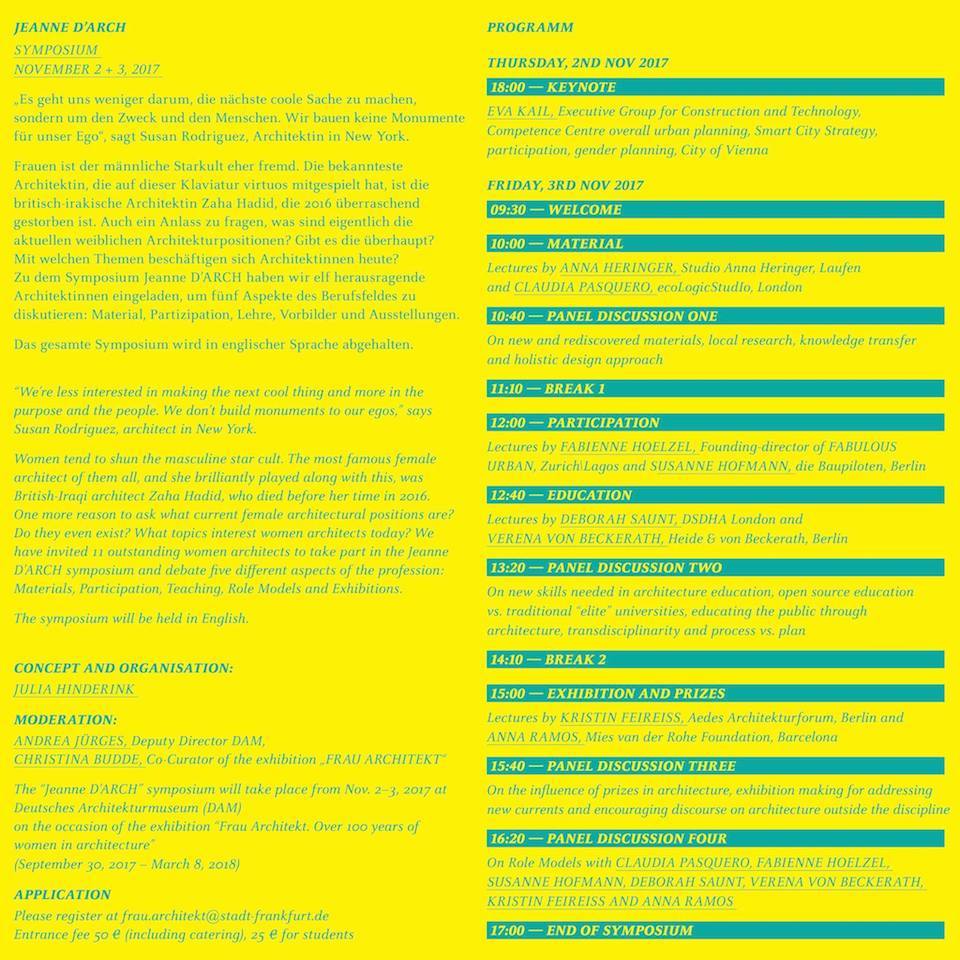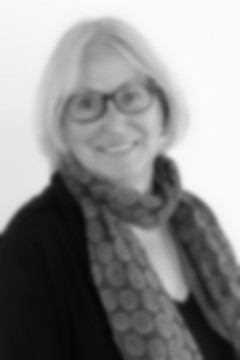









Jeanne D'ARCH
Symposium on the occasion of the exhibition "Frau Architekt. Over 100 years of women in architecture"
Symposium 2nd and 3rd of November 2017
Deutsches Architekturmuseum DAM, Schaumainkai 43, 60596 Frankfurt am Main
The “Jeanne D’ARCH” symposium is curated by Julia Hinderink and took place from Nov. 2-3, 2017 at Deutsches Architekturmuseum DAM, Schaumainkai 43 in Frankfurt on the occasion of the exhibition “Frau_Architekt. Over 100 years of women in architecture”
Panelists
Verena von Beckerath, architect, HEIDE & VON BECKERATH Berlin
Kristin Feireiss, architecture curator, writer, and editor, founder of AEDES, Berlin
Anna Heringer, architect, Laufen
Fabienne Hoelzel, architect and director of FABULOUS URBAN Zurich/Lagos
Susanne Hofmann, architect and founder of Die Baupiloten, Berlin
Eva Kail, gender Expert City of Vienna
Claudia Pasquero, architect, founder ECOLOGIC STUDIO, London
Anna Ramos, architect, manager of the Mies van der Rohe Foundation, Barcelona
Moderation: Andrea Jürges, Deputy Director DAM, Julia Hinderink
kindly supported by
Groß&Partner, HPP Architekten, JO Franzke Generalplaner, Jürgen Engel Architekten, Magnus Kaminiarz &Cie Architektur, msm meyer schmitz-morkramer, Schneider+Schumacher, Urban Progress, Wörner Traxler Richter Planungsgesellschaft, Transsolar, Ferdinand Heide Architekt
Gesamtdokumentation
videos of all lectures and panel discussions
Abstract on Jeanne D’ARCH
“We’re less interested in making the next cool thing and more in the purpose and the people. We don’t build monuments to our egos,” says Susan Rodriguez, architect in New York.
Women tend to shun the masculine star cult. The most famous female architect of them all, and she brilliantly played along with this, was British-Iraqi architect Zaha Hadid, who died before her time in 2015. One more reason to ask what current female architectural positions are? Do they even exist? What topics interest women architects today? We have invited 9 outstanding women architects to take part in the Jeanne D’ARCH symposium and debate five different aspects of the profession: Materials, Participation, Teaching, Role Models and Exhibitions.
Materials research as the starting point – can lead to trailblazing ecological approaches being transferred from biology into architecture, as Claudia Pasquero / Ecologic Studio shows. And a coherent focus on clay as a building material is also gaining in importance. Anna Heringer has not only managed to put clay buildings firmly back on the agenda, but with her projects has also had many a success in fostering a sense of community.
The ecological economic and social challenges that architecture and urban planning have to face today call for transdisciplinary methods and outstanding team players if the solutions are to endure. Inclusive and intuitive forms of communication are indispensable if we are to create the space for large groups and foreign cultures, and manage construction processes accordingly. Two specialists in Participation, Susanne Hofmann and Fabienne Hoelzel, shed light on the topic from a German and from a Nigerian perspective.
The special “soft skills” required to implement participatory projects are not taught in traditional Architecture courses. So what should architecture and urban planning curricula ideally look like today? This will be debated by Verena von Beckenrath and Deborah Saunt, co-founder of the London School of Architecture, which originated in a think tank for new models for architectural courses and is renowned for its innovative approaches and methods.
So do we need new architectural schools? How does the focus of the curricula shift and how do the latter differ from traditional courses of study? How do teaching, professional life and architecture Exhibitions dovetail? The new Director of the Fundació Mies van der Rohe, Anna Ramos, is responsible not only for the curatorial program for the Mies van der Rohe Pavilion, but also for the organization and future of the Mies van der Rohe Award, the European Union Prize for Contemporary Architecture. Architectural exhibitions and prizes are always a way of taking stock and addressing new currents in the discipline. Which are prize- worthy and then receive the highest architectural accolade of them all, the Pritzker Prize, is something that Kristin Feireiss helps decide.
Zaha Hadid was the first woman to win this cherished distinction and she became a role model for many women architects. What Role Models do we have today, and what do they stand for?
The “Jeanne D’ARCH” symposium was curated by Julia Hinderink and will take place from Nov. 2-3, 2017 at Deutsches Architekturmuseum DAM, Schaumainkai 43 in Frankfurt on the occasion of the exhibition “Frau_Architekt. Over 100 years of women in architecture” (Sept. 30, 2017 – March 8, 2018)
Biographies
Verena von Beckerath
is a co-founder and principal of the Berlin-based firm HEIDE & VON BECKERATH. She pursued Cultural Studies at the Université de Paris Sorbonne as well as at the Universität Hamburg and studied Architecture at the Technische Universität Berlin. She has taught at Universität der Künste Berlin and was Visiting Professor at Technische Universität Braunschweig. Verena von Beckerath held a fellowship at Villa Massimo in Rome and was Visiting Critic at Cornell University, Ithaca, NY. Studio work, writings, lectures, workshops and visiting critics. Lives and works in Berlin, Germany.
Kristin Feireiss
is an architecture curator, writer, and editor. In 1980, she co-founded the independent forum for architecture Aedes in Berlin. Feireiss’s work deepens understanding of international architecture and urban development including the cultural, social and economic factors. As director of the Netherlands Architecture Institute (NAi) from 1996 to 2001, she brought greater attention to the transformative processes affecting cities. Feireiss was commissioner of the Dutch Pavilion at the Architecture Biennale in Venice in 1996 and 2000, and a 2012 member of the International Jury for the Architecture Biennale in Venice. In 2013 she was named a Knight of the Order of the Netherlands Lion. She serves in the European Cultural Parliament.
Feireiss has edited numerous books on international architecture and urban context, including Architecture in Times of Need, on innovative, sustainable, affordable housing to redevelop New Orleans’ Lower Ninth Ward, after Hurricane Katrina. Feireiss also co-edited two volumes of Architecture of Change: Sustainability and Humanity in the Built Environment. These feature outstanding sustainable architecture and social initiatives and underscore how architects must address issues of sustainability and social justice.
Anna Heringer
For Anna Heringer (born 1977), architecture is a tool to improve lives. As an architect and honorary professor of the UNESCO Chair of Earthen Architecture, Building Cultures, and Sustainable Development she is focusing on the use of natural building materials. She has been actively involved in development cooperation in Bangladesh since 1997. Her diploma work, the METI School in Rudrapur got realized with Eike Roswag in 2005 and won the Aga Khan Award for Architecture in 2007. Over the years, Anna has realized further projects in Asia, Africa, and Europe. She lectures worldwide and has been a visiting professor at various universities, including Stuttgart, Linz, Vienna, Zurich. She received numerous honors, including the Global Award for Sustainable Architecture, the AR Emerging Architecture Awards in 2006 and 2008, the Loeb Fellowship at Harvard’s GSD and a RIBA International Fellowship. Her work was widely published and exhibited in the MoMA New York, the V&A Museum in London and at the Venice Biennale among other places. In 2013 with Andres Lepik and Hubert Klumpner she initiated the Laufenmanifesto where practitioners and academics from around the world contributed to define guidelines for a humane design culture.
Fabienne Hoelzel
is Professor of Architecture and Urban Design at the Stuttgart State Academy of Fine Arts and the founding-director of FABULOUS URBAN, a design, research and planning practice for less developed regions, after working for one of Latin America‘s largest slum-upgrading programs as the head of the urban design and planning team at the Social Housing and Urban Development Authority of São Paulo, Brazil, that was awarded in 2012 the UN Habitat Scroll of Honor for its pioneering work. From 2008 to 2010 and from 2013 to 2017, Fabienne held a research and teaching position at the Institute of Urban Design at the ETH Zurich, where she was as well the Academic Co-Project Manager of 2017 Schindler Global Award and the co-editor of the accompanying publication with the same title. She lectures and writes on a regular base. FABULOUS URBAN is currently involved into the Makoko Regeneration Plan, Lagos, Nigeria, that was shortlisted for the 2014 Fuller Challenge, and implemented recently the pilot "Makoko Neighborhood Hotspot"—some sort of multipurpose community center. Commissioned by the Heinrich Böll Foundation Nigeria, Fabienne coordinated and published the research study "Urban Planning Processes in Lagos. Policies, laws, planning instruments, strategies and actors of urban projects, urban development, and urban services in Africa’s largest city", in collaboration with local researchers and urban planning students of the University of Lagos. FABULOUS URBAN is further involved in a series of community empowering sanitation solutions in several slum areas in Lagos, in collaboration with the Nigerian Slum/ Informal Settlement Federation and JEI.
Susanne Hofmann
Susanne Hofmann is the founder and director of the Berlin architecture office Die Baupiloten BDA, an interdisciplinary practice specializing in educational, cultural, and housing projects as well as socially-engaged urban development generated through unique participatory design strategies. The work of Die Baupiloten focuses on innovative experimental design that is driven by both a social and ecological agenda. For her PhD, Hofmann researched and developed “atmosphere as a participatory planning strategy (“Atmosphäre als partizipative Entwurfsstrategie”), which was expanded upon in the book “ARCHITECTURE IS PARTICIPATION”. In the recently re-printed book, she illustrates – through her research and the built projects of Die Baupiloten – how user-participation can be successfully and productively implemented and integrated into the architectural design process.
From 2009 – 2015 Susanne Hofmann was the interim Professor for the Department of Participatory Design and Construction, Housing, and Cultural Buildings at the Technical University Berlin. There, she founded the Study-Research Project Die Baupiloten in 2003, which she directed until 2013. Additionally, she has previously held international teaching positions since 1996 in London, Melbourne, Auckland, Cairo, and Sheffield. She currently serves as Guest-Professor at the University of Vienna, a position she has held since 2016.
Eva Kail
Eva Kail has studied Urban and Regional Planning at the Technical University of Vienna.
She works for the City of Vienna since 1986. She was the first Head of the Women´s Office(1991-1998) and built up and run the Co-Ordination Office for Planning and Construction Geared to the Requirements of Daily Life and the Specific Needs of Women (1998-2009). Since 2010 she works as the Gender Expert in the Competence Centre overall planning, Smart City Strategy, participation, gender planning in the Executive Group for Construction and Technology. She coordinated about 60 Pilot Projects in the fields of Housing, Mobility, Public Space, Urban Development and Social Infrastructure and is one of the leading administrative experts for Gender Planning in Europe.
Claudia Pasquero
graduated from Turin Polytechnic in 2000, and consequently completed the AA EE Master Programme, she is co-founder of ecoLogicStudio. She has working experience as architect in international offices such as Ushida Findlay Partnership and Erick Van Egerat Architects. She took part to the London and Venice Architectural Biennale with an installation called STEM and is codirecotr of Fibrous Structures Project. Claudia has been teaching and lecturing internationally including East London University, Turin Polytechnic, The Kingston University (London), UDLA (Puebla, Mexico City), IAAC (Barcelona), ITU (Istanbul), Bilgi University (Istanbul) and others; she is currently Unit Master of Inter10 at the Architectural Association School of Architecture London.
Anna Ramos
Anna Ramos, (1974) is the new Manager of the Mies van der Rohe Foundation in Barcelona. She is a practicing architect and associate professor at the ETSAB, where since 2014 she has also been Deputy Director of International Relations. At postgraduate level she holds a UPC diploma in Advanced Construction, Restoration and Architectural Refurbishment Studies and is currently working on her PhD thesis at the same university.
Having set up her own practice in Barcelona in 2000, she has developed renovation projects such as the one for the Teatre de Sarrià, designed public facilities like the headquarters of the Serra del Montsant Natural Park in El Priorat (Tarragona), and executed small-scale and mid-scale private commissions.
Between 2005 and 2008 she was President of the Agrupació de Joves Arquitectes (AJAC) at the COAC, and as such she contributed to organising the AJAC Award. And her responsibilities as Deputy Director of International Relations at the ETSAB have included collaborating with the Fundació Mies van der Rohe, both in the last edition of the Mies van der Rohe Award and in signing the covenant between Tongji University, the Fundació and ETSAB for the academic dissemination of the Mies van der Rohe Award archive.
As the new Manager, she contemplates developing a set of projects whose aim is to bring the Mies van der Rohe Pavilion closer to both Barcelona citizens and to professionals from all over the world and to enhance the experience of visiting the Pavilion. And in the international sphere, she aims to uphold and potentiate the Mies van der Rohe Award as official acknowledgement of European Union architecture as well as to establish new forms of collaboration with international organisations and institutions.
Deborah Saunt
Saunt‘s practice DSDHA blurs the boundaries between landscape and architecture, art and urbanism, intimacy and infrastructure; always questioning our preconceptions around the city. It is founded on a persistent search for new forms of beauty through active design, research and agency within an ethos that “the City is our Client." The multi-disciplinary studio has built an international reputation, delivering a range of high profile individual buildings and macro-scaled urban strategies and research projects. Recent examples include several major mixed-use schemes in the metropolitan centre, a case study home exploring the densification of London’s backlands, and various award winning education schemes including the RIBA Stirling Prize shortlisted Christ’s College. DSDHA is currently engaged in a series of public realm improvements in the Tottenham Court Road area and The British Museum, as well as around the Royal Albert Hall – a project that resulted from a research fellowship Deborah undertook for the Royal Commission for the Exhibition of 1851. In addition DSDHA contributes spatial design expertise on a pro bono basis to several community focused projects. Having completed her PhD thesis as part of the RMIT Practice Research programme – of which she is now an ADAPT-r fellow – Deborah has taught internationally as well as being a member of various prestigious advisory boards and judging panels, as well as a commissioner for the Independent Transport Commission (ITC). Deborah believes passionately in the democratisation of architecture, setting up the Jane Drew Prize in Architecture as a well as is being on the founding faculty for the new London School of Architecture (LSA).
Picture credits
Anna Heringer @Stefano Mori
Claudia Pasquero @Luka Lu Boskovic
Eva Kail @ Rudolph Schmied
Susanne Hofmann @ die Baupiloten
Fabienne Hoelzel @ Marco Sieber
Verena von Beckerath @ Gitty Darugar
Anna Ramos @ Anna Mas
Kristin Feireiss @ Aedes
Deborah Saunt @ dsdha